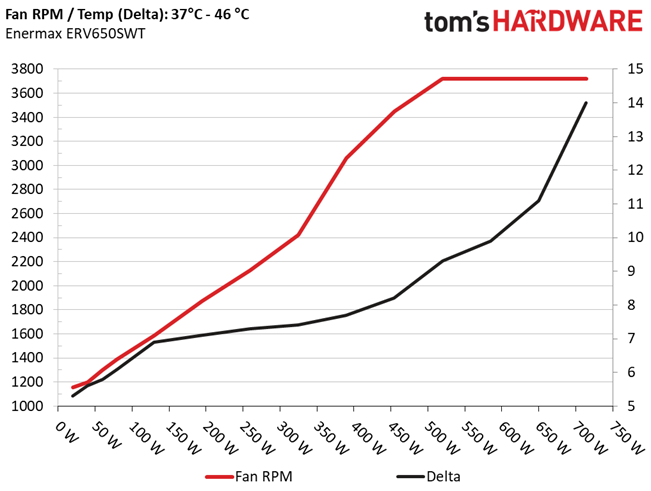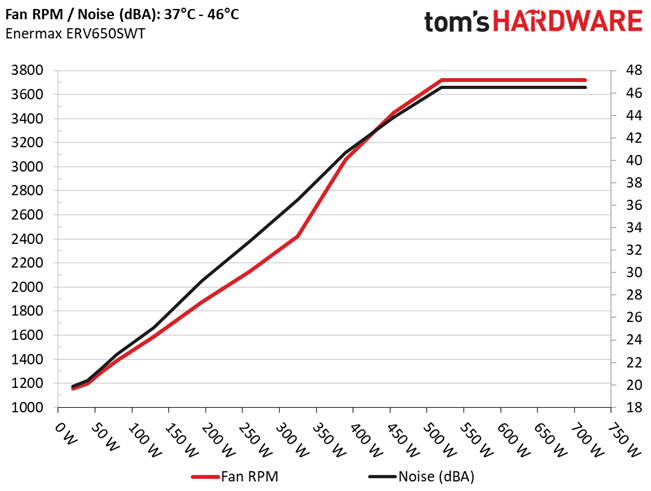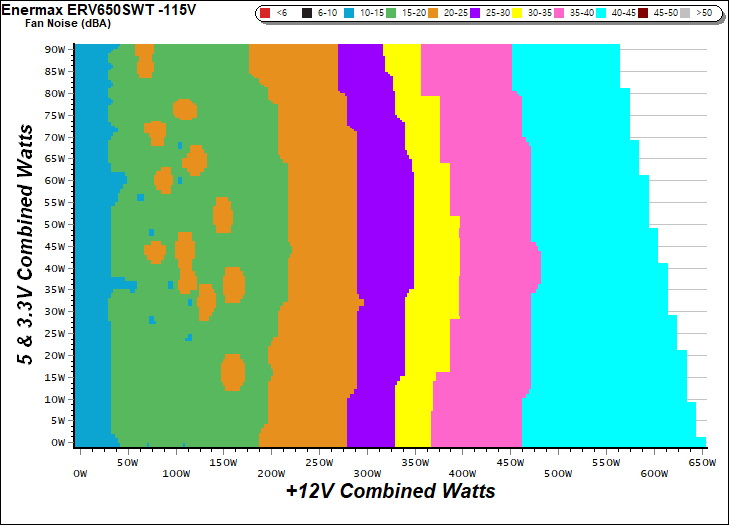Enermax Revolution SFX 650W PSU Review
Why you can trust Tom's Hardware
Efficiency, Temperature & Noise
Efficiency
Our efficiency testing procedure is detailed here.
Using results from the previous page, we plotted a chart showing the ERV650SWT's efficiency at low loads, and loads from 10 to 110 percent of its maximum-rated capacity.
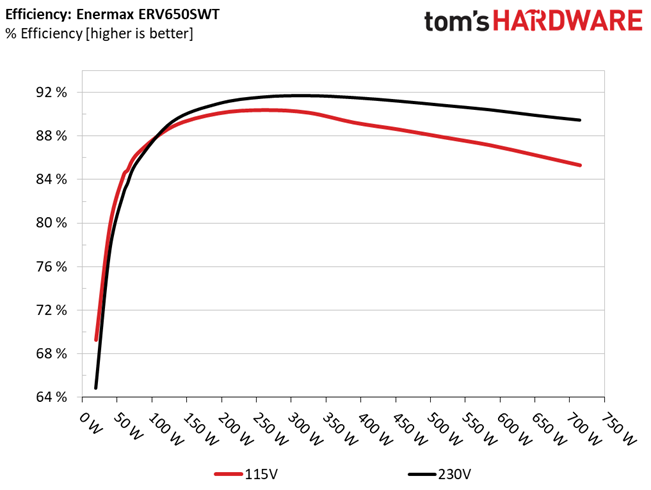
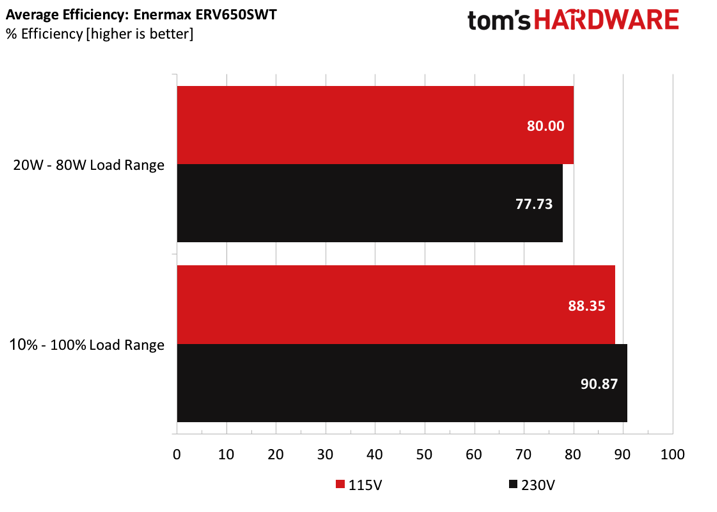
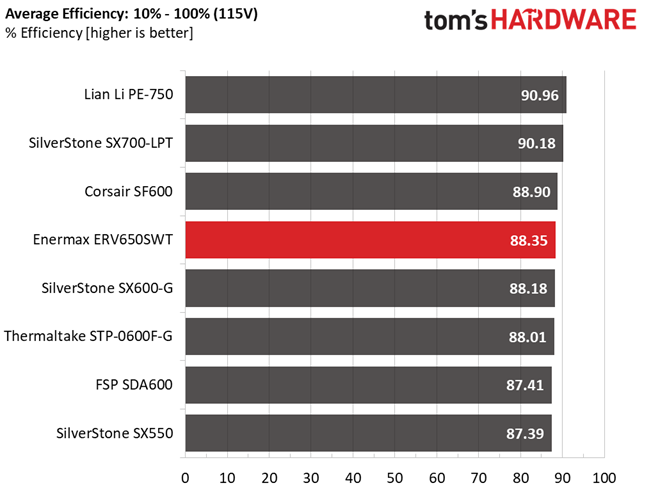
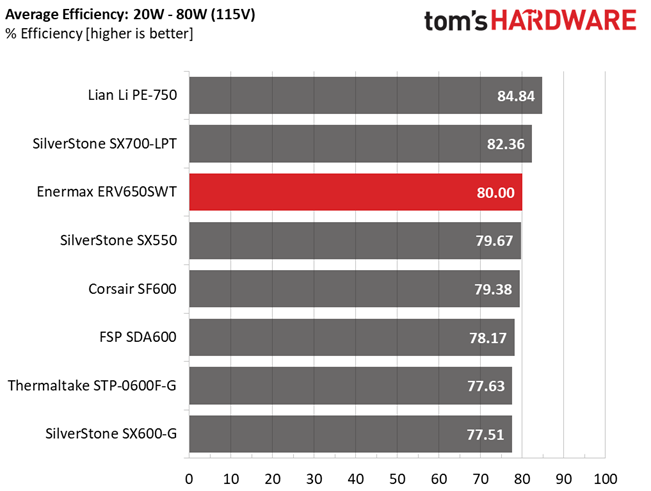
The efficiency that this platform achieves is on par with the competition. Under light loads, Enermax takes the lead from competition in the same 80 PLUS tier.
Efficiency At Low Loads
In the following tests, we measure the efficiency of Enermax's ERV650SWT at loads significantly lower than 10 percent of its maximum capacity (the lowest load the 80 PLUS standard measures). The loads we dialed were 20, 40, 60, and 80W. This is important for representing when a PC is idle, with power-saving features turned on.
| Test # | 12V | 5V | 3.3V | 5VSB | DC/AC (Watts) | Efficiency | Fan Speed | Fan Noise | PF/AC Volts |
|---|---|---|---|---|---|---|---|---|---|
| 1 | 1.202A | 0.492A | 0.481A | 0.196A | 19.695 | 69.263% | 1155 RPM | 19.9 dB(A) | 0.881 |
| 12.164V | 5.050V | 3.328V | 5.045V | 28.435 | 115.13V | ||||
| 2 | 2.429A | 0.989A | 0.990A | 0.396A | 39.806 | 79.813% | 1200 RPM | 20.4 dB(A) | 0.948 |
| 12.157V | 5.047V | 3.323V | 5.039V | 49.874 | 115.13V | ||||
| 3 | 3.657A | 1.477A | 1.505A | 5.033A | 59.877 | 84.505% | 1300 RPM | 21.5 dB(A) | 0.965 |
| 12.150V | 5.042V | 3.320V | 5.033V | 70.856 | 115.13V | ||||
| 4 | 4.877A | 1.985A | 1.989A | 0.796A | 79.830 | 86.434% | 1390 RPM | 22.7 dB(A) | 0.960 |
| 12.145V | 5.039V | 3.316V | 5.028V | 92.360 | 115.13V |
The small fan spins even with 20W load because of the ambient temperature we test at, which comes close to 36°C.
During the last two tests, the PSU's efficiency easily exceeds the 80% mark. We'd like to see over 70% efficiency during the first test, though.
5VSB Efficiency
The ATX specification, along with CEC, ErP Lot 3 2014 and ErP Lot 6 2010/2013, states that 5VSB standby supply efficiency should be as high as possible, recommending 75 percent or higher with 550mA, 1A, and 1.5A of load. The PSU should also achieve higher than 75% efficiency under full load, or with 3A if its maximum current output at 5VSB is higher than 3A.
Get Tom's Hardware's best news and in-depth reviews, straight to your inbox.
We take six measurements: one each at 100, 250, 550, 1000, and 1500mA, and one with the full load the 5VSB rail can handle.
| Test # | 5VSB | DC/AC (Watts) | Efficiency | PF/AC Volts |
|---|---|---|---|---|
| 1 | 0.102A | 0.510 | 75.893% | 0.066 |
| 5.019V | 0.672 | 115.14V | ||
| 2 | 0.252A | 1.264 | 80.356% | 0.141 |
| 5.016V | 1.573 | 115.14V | ||
| 3 | 0.542A | 2.718 | 81.769% | 0.243 |
| 5.011V | 3.324 | 115.14V | ||
| 4 | 1.002A | 5.016 | 82.081% | 0.327 |
| 5.004V | 6.111 | 115.14V | ||
| 5 | 1.502A | 7.503 | 81.991% | 0.373 |
| 4.995V | 9.151 | 115.14V | ||
| 6 | 3.002A | 14.922 | 80.782% | 0.435 |
| 4.971V | 18.472 | 115.13V |
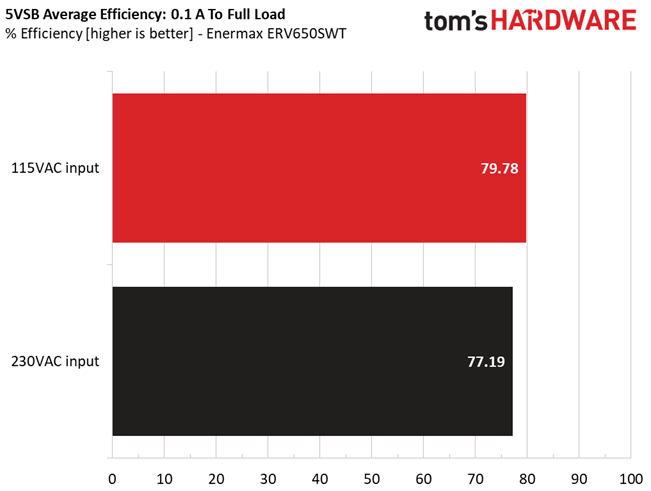
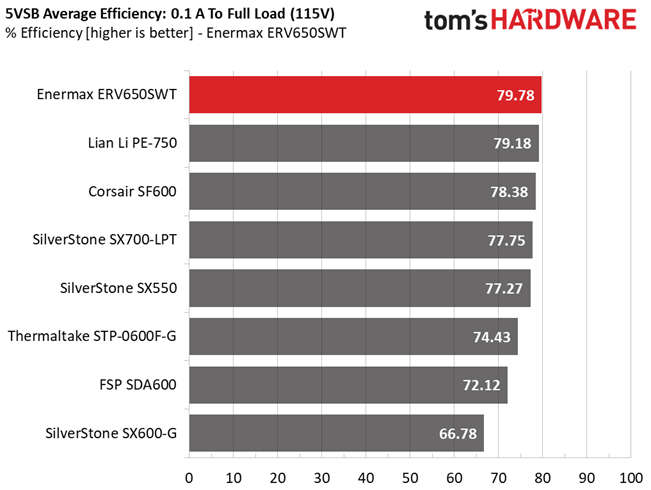
The 5VSB rail is highly efficient, allowing the ERV650SWT to easily take first place.
Power Consumption In Idle And Standby
In the table below, you'll find the power consumption and voltage values of all rails (except -12V) when the PSU is idle (powered on, but without any load on its rails), and the power consumption when the PSU is in standby mode (without any load, at 5VSB).
| Mode | 12V | 5V | 3.3V | 5VSB | Watts | PF/AC Volts |
|---|---|---|---|---|---|---|
| Idle | 12.244V | 5.050V | 3.331V | 5.048V | 8.230 | 0.486 |
| 115.1V | ||||||
| Standby | 0.082 | 0.004 | ||||
| 115.1V |
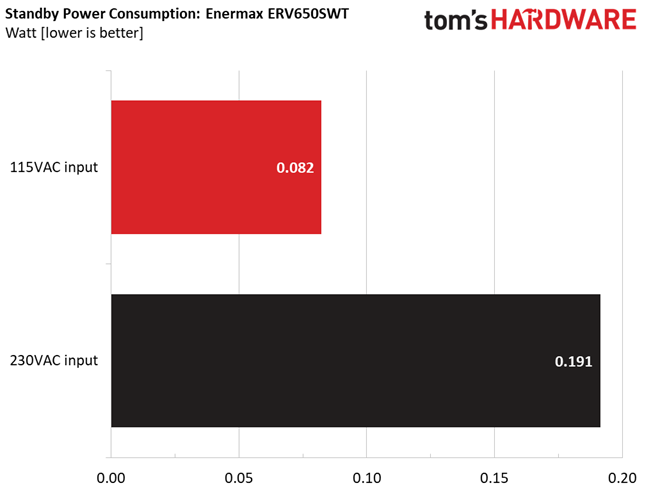
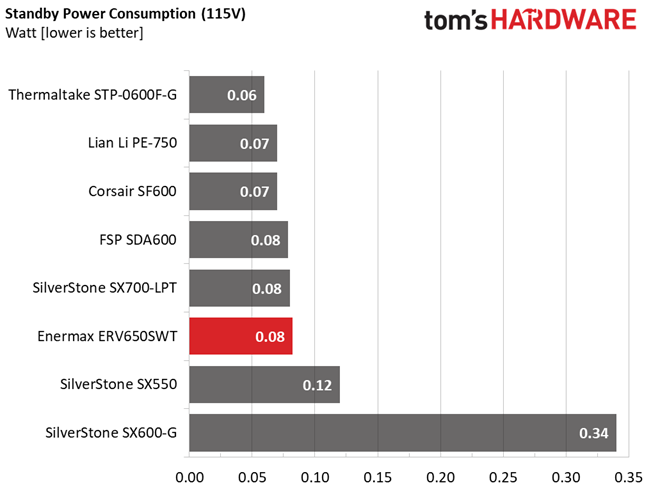
Vampire power is low with 115V and a little higher than expected with 230V.
Fan RPM, Delta Temperature, And Output Noise
Our mixed noise testing is described in detail here.
The chart below illustrates the cooling fan's speed (in RPM), and the delta between input and output temperature. The results were obtained at 37°C (98.6°F) to 46°C (114.8°F) ambient temperature.
Next, we show the cooling fan's speed (again, in RPM) and output noise.
We measured acoustics from one meter away, inside a hemi-anechoic chamber. Background noise inside the chamber was below 6.0 dB(A) during testing, and the results were obtained with the PSU operating at 37°C (98.6°F) to 46°C (114.8°F) ambient temperature. Thanks to our newly acquired Brüel & Kjær Type 4955a mic, we are able to perform low-noise measurements with great accuracy.
The following graph illustrates the fan's output noise over the PSU's operating range. The same conditions of the above graph apply to our measurements, though the ambient temperature was between at 30°C (86°F) to 32°C (89.6°F).
Under very light loads, the fan's noise is minimal. And noise remains low at loads of up to 180W. But with more than 330W, the PSU's fan starts to make its presence felt. Beyond 460W, the fan profile goes crazy and our measurements land in the 40-45 dB(A) range.
MORE: Best Power Supplies
MORE: How We Test Power Supplies
MORE: All Power Supply Content
Current page: Efficiency, Temperature & Noise
Prev Page Load Regulation, Hold-Up Time & Inrush Current Next Page Protection Features
Aris Mpitziopoulos is a contributing editor at Tom's Hardware, covering PSUs.
-
shrapnel_indie How many motherboards require more than one EPS connector in the entry to enthusiast level motherboards (excluding server boards)? How many server boards? How many enthusiasts actually use server boards?Reply
IMHO, if a PSU has 1 or 2 EPS connectors shouldn't be a pro or con as the vast majority of boards used from entry level to enthusiast only really requires one connector. Server boards are a different matter. IMHO, just making a clear note how many EPS connectors should be good enough. -
TMTOWTSAC I can see wanting more than 2 PCIe of course, but how many SFX models come with 2 EPS? How many dual CPU micro atx mobos are there anyway?Reply -
Ne0Wolf7 Why would you ever want there not to be a power switch? I use mine all the time... It seems like such a simple thing to add too.Reply -
10tacle ^^That's the first thing I noticed in the pictures. I use mine on occasion too, especially when getting lockups during overclock testing. Flicking a switch is a lot more convenient than reaching around and unplugging and making sure the cable doesn't fall down behind the desk causing colorful four letter language. Unwise omission that is inexcusable in this category of PSU. I would rule out this PSU just for that omission alone.Reply
-
Aris_Mp about the two EPS connectors, most mid to high-end mainboards use one EPS and one ATX12V (so they need two CPU connectors) especially the new ones. Why not have this option and be restricted to mainstream mainboards. Not only server or dual CPU mainboards require two EPS connectors.Reply -
Marcus52 Enermax still hasn't recovered their quality since they shut down their own production facilities, which is a real shame, they used to be one of the best.Reply -
superflykicks03 You guys literally have ads that play over the top of your intrusive popup videos. You literally have to watch a 30 second ad before you get to watch the unwanted video :/ Not exactly user friendly. I know I know revenue blah blah, and just get a popup blocker yadda yadda.Reply -
maxwellmelon Why would you turn off the power on the power supply on computer lockup. Just hit the reset switch. I would venture to say 9 out of 10 people could care less as there pc is always on.Reply -
10tacle Because hitting reset from the case button does not guarantee a solid reboot. On my system anyway.Reply -
warmon6 For an SFX psu, not having a power switch on the PSU doesn't bother me to much.Reply
Depending on the case design (like my rvz01), you couldn't access the psu without taking the computer apart to access that switch. So unplugging the computer or holding the power button for 5 seconds would be a lot faster.
Now if this was an ATX PSU i would give a bit more care for as it's extremely rare for an ATX psu to be placed somewhere else inside the case that cant be access from the outside.
@10TACLE
I do have to ask though, does your computer lock up so much that even holding the case power button for the 3 to 5 seconds does nothing?
Most computers I've messed with seems to be able to power off fully even when there is a hard lockup doing that method.
But i do agree with you about that hitting a reset doesn't guarantee a solid reboot. Certainly when trying to dial in overclock settings.
